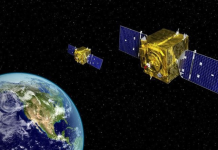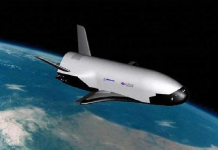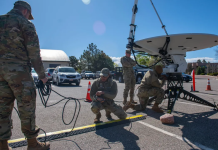The Space Force lacks the proper funding to acquire the capabilities needed to protect the nation’s vital interests in space, a retired general said.
The Space Force needs to develop credible defensive systems that can deter adversaries from attacking its systems, said retired Air Force Gen. Kevin P. Chilton, who now chairs the Mitchell Institute Spacepower Advantage Center of Excellence (MI-SPACE).
“The rise of adversary anti-satellite weapons, particularly by China and Russia, necessitates equipping the United States Space Force with a full spectrum of counterspace capability. The reality is that space is now a warfighting domain, and we must take the necessary steps to ensure leaders are empowered with smart options,” Chilton said during a Mitchell Institute for Aerospace Studies webinar.
The institute recently released a new policy paper, “Building U.S. Space Force Counterspace Capabilities: An Imperative for America’s Defense,” by Charles Galbreath, senior resident fellow for Space Studies at MI-SPACE. This paper outlined the Space Force’s need to deter Chinese aggression.
“Adversaries have taken actions to place weapons in space, and to develop counter space capabilities that threaten our space systems. And we as a nation need a viable set of credible options to deter potential aggression,” Galbreath said during the webinar.
These weapons can now disrupt, degrade and, in some instances, defeat U.S. space systems that weren’t originally designed for combat. With a budget smaller than any other U.S. military service, the Space Force lacks the funding to fully defend itself in space, according to the report.
“We’ve seen too many examples recently of China and Russia taking aggressive behavior through air and at sea. And certain actions in Ukraine by Russia indicate that that they’re not willing to follow norms, so we need other means of deterring conflict other than just norms,” Galbreath said. Competition in space is fine, but the United States doesn’t want to escalate to crisis or conflict, he added.
The Space Force has three basic parts to its deterrence strategy, he said. First, it wants to avoid operational surprise by using the nation’s space surveillance network and its space domain awareness, which would require improvements in developing and acquiring updated sensor feeds.
The Space Surveillance Network and the Satellite Control Network need additional capacity, Galbreath said. “That’s doubly so when we start talking about potentially identifying where threats are, identifying what your weaknesses are and being able to employ means to negate those. We must have positive control and assured access to those weapons in space if we decide we need them,” he said.
“The second area of competitive deterrence is denying first-mover advantage, and the key premise here is that we need to make ourselves as resilient as possible so that an enemy attack won’t have the desired effect,” he said.
The last tenet is to have a clear policy that will unify the nation’s efforts and signal to potential adversaries that the U.S. will take all necessary precautions to protect itself.
Without proper support and funding from Congress the Space Force will not be prepared to defend against adversary attacks, Galbreath said.
“I think it’s clear how much we rely on space, how much we rely on space as a military and as a nation. We must protect those capabilities that are threatened. It’s about deterring conflict; providing senior leaders with options to stabilize crises and deter conflict,” he said.
“We absolutely need these counter space capabilities to give future leaders options. It’s not about warfare in space. It’s not about space for space’s sake. It’s about protecting lives on the ground. It’s about assuring access to space, protecting the vital interests of the nation and puttering conflict,” Galbreath said.





